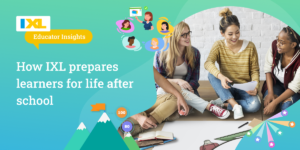Jennifer Deabler is an IXL Professional Learning Specialist with over 12 years of an experience as a primary- and secondary-level educator, interventionist, and math department chair. Through her work she used her pedagogical skills to systematically diagnose learning gaps, plan for and implement targeted instruction, and assess student mastery.
As education and the workplace evolve, the ability to perform well in collaborative environments is more important than ever. In my experience working in Career and Technical Education, I hosted yearly meetings with local business stakeholders about the essential skills students must bring to the workforce. The answer was clear: Power skills!
Power skills help people effectively work with others and manage the daily aspects of education, work, and life. Some of the most important power skills include:
- Emotional intelligence
- Time management
- Critical thinking & problem-solving
- Teamwork
- Adaptability
Like any skill, power skills need to be taught and honed over time. IXL helps students grapple with power skills, apply them, and receive the feedback needed to excel at them. Let’s explore some ways IXL develops power skills by going through the example skills listed above.
Emotional intelligence
Emotional intelligence involves the ability to regulate emotions by identifying our emotional state and addressing our needs in healthy ways.
IXL’s scoring system, the SmartScore, builds emotional intelligence by encouraging students to power through setbacks. It takes a growth mindset approach to student progress; getting a score of 100 on a skill is always possible, even if questions get harder over time and students may struggle along the way.
Since IXL saves progress between sessions, educators can encourage students to take breaks when they feel frustrated or fatigued. Modeling how to take breaks instead of quitting keeps learners moving forward while building their grit and determination.
Time management
To be effective time managers, students have to learn to plan, set goals, and prioritize. Improving these skills means giving students some choice in what they do so that they learn to manage their time effectively.
IXL’s student dashboard was designed to help learners select and prioritize their tasks. Students can see teacher-suggested skills, skills they recently practiced, or even access their Recommendations Wall to identify personalized areas of need.
With this information clearly laid out, you can help students understand that assigned skills should be high-priority, while they can work on choice tasks after the essential work is finished. If a student has taken the IXL Diagnostic, skills from their personalized action plan could also be of high importance.
Critical thinking & problem-solving
Critical thinking and problem-solving include the ability to analyze information, utilize deductive reasoning, synthesize information, and evaluate decisions to find solutions to unique situations.
IXL’s science and social studies skills are perfect for developing critical thinking as they bring students into a museum-like environment. As students progress through different stages of learning, they are constantly analyzing what they encounter, synthesizing new information, interpreting data, evaluating answer options, and using their reasoning skills to identify appropriate solutions.
To help with problem-solving, instructional resources embedded in IXL skills provide students with information to help them identify their mistakes and learn from them. With video tutorials and detailed question walkthroughs, students have what they need to figure out new topics on their own.
Teamwork
IXL doesn’t just support students working independently; it’s also flexible enough to be great for group work! Many IXL reports, such as the Skill Analysis report, make it easy for teachers to create small groups based on student performance.
Once the groups are set, IXL has several tools to turn the classroom into a fun, collaborative learning environment. Group Jams let every student work on the same question at the same time, setting them up for discussions with their classmates. If teachers want to foster a friendly competition, they can set up a Lightning Jam or a Leaderboard and have students pitch in to see which team understands the material the best.
Adaptability
The path to progress isn’t the same for everyone. Sometimes a student needs a topic broken down into small steps that they tackle one at a time, or they have learning gaps that they need to fill before they move forward. IXL is designed to help students identify those moments themselves and adapt their path to address them.
For each academic topic, IXL offers several carefully scaffolded skills that start out basic and get more complex. As an example, if a student learning about literary devices has trouble figuring out the meaning of metaphors, they could start with a more basic skill that asks them to simply identify a sentence with a metaphor and work from there.
Additionally, if a student gets stuck on a skill, in-skill recommendations available at the bottom of the page provide them access to related foundational skills. Students can practice those skills and return to their original skill when they feel ready to attack it. Having these scaffolded resources at their fingertips helps students change course as needed.
I encourage you to check out the resources mentioned above and be creative about ways you use IXL to help your learners build their power skills! To learn more about what IXL has to offer, explore the IXL blog.
